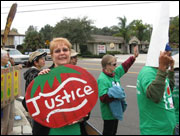Clearwater UUs lauded for deep-seated social activism
For decades, congregation has advocated for civil rights, farmworkers, immigrants, and LGBT rights.
In the 1950s and 60s, the congregation was active in the civil rights movement in Florida, including desegregation of local schools, especially during the ministries of the Rev. Richard Norsworthy and the Rev. John Burciaga.
In more recent times the congregation has developed a deep partnership with farmworkers in Florida and has advocated for immigration reform as well as rights for LGBT people. It also has a strong environmental justice ministry.
The award was presented to the Rev. Abhi Janamanchi at General Assembly in June in Louisville, Ky. In an interview after General Assembly, Janamanchi said that when he was called by the congregation in 1999, there was a solid base of activism among members. “The ministers who served this congregation established a culture of awareness. They engaged with the community and led by example. Throughout the years people have joined this congregation because they wanted to be engaged in justice work. When I arrived we built on that, creating a broader social justice ministry.”
He helped the congregation develop a social justice council organized around four aspects: economic justice, environmental justice, human rights, and congregation-based community organizing. The congregation also used the UUA’s Social Justice Empowerment program to organize and strengthen its social justice ministries.
Janamanchi said justice work at Clearwater has evolved. “Within the congregation there’s been an evolution from looking at social justice as charity work. That is still an important aspect, but we’ve added social activism and public witness. That gives people more focus and a chance to be engaged in different forms and as a spiritual discipline rather than just doing something for someone else.”
At the heart of the congregation’s ministries is its longtime partnership with the Coalition of Immokalee Workers, dating from the group’s inception more than 13 years ago as a community-based organization of mostly Latino, Mayan Indian, and Haitian immigrants working in low-wage jobs in Florida. Immokalee is the state’s largest farmworker community.
The partnership began with support of the group’s boycotts—aimed at raising prices for picked tomatoes and other crops—and grew to include organizing for compassionate immigration reform on the state and federal levels. The congregation’s work also helped stop prospective anti-immigrant legislation similar to the SB 1070 measure passed in Arizona.
The congregation has also advocated in support of LGBT people, including supporting the transgender city manager of Largo, Fla., who was unfairly fired. The congregation actively supports marriage equality, including helping to defeat a state constitutional amendment last year that would have barred same-sex marriage. It was one of the first congregations to earn the Welcoming Congregation designation. It also has partnerships with a congregation in Transylvania and a school in the Khasi Hills of India.
For more than 10 years, the congregation has also had a strong environmental justice ministry. In 2012 it became a certified Green Sanctuary congregation. It has policies in place on recycling, energy use, and ethical eating, and it supports fair trade coffee. It also has a permaculture vegetable garden.
Its interfaith ties are strong in the Tampa Bay area. Janamanchi helped organize the Interfaith Coalition of Tampa Bay, which has held a number of community services in response to disasters and tragedies, ranging from Hurricane Katrina to the Newtown, Conn., school shootings. Janamanchi has cultural and religious ties to Hindu and Buddhist traditions and that has also contributed to creating a strong interfaith presence.
Congregation members do a monthly social justice testimonial during Sunday services. The testimonials are to inform the congregation about various social justice ministries and how individuals in the congregation are living out those ministries.
Janamanchi, who will leave the congregation this month to become senior minister at Cedar Lane UU Church in Bethesda, Md., said that throughout the church’s history, people have joined UUs of Clearwater because of its focus on social justice.
Linda Stoller, coordinator of the congregation’s social justice council, said that adopting a social justice council model has been good for the congregation. “It means that different groups of people take a lead role rather than the same people always leading. And it’s helped more people get involved because each team leader recruits for their team. If people are doing something they are passionate about they have more energy for it.”
The congregation’s next social justice advance will be to get more involved with community-based congregational organizing. It recently joined a coalition of 35 other congregations. “One of the things we’ve learned is you can’t make as much change as a single congregation as you can if you join with others,” Stoller said.
She added, “Social justice is what attracted me to the congregation, and it made me join, and it has kept me here. This is where my heart is. Working within my faith has really expanded my own commitment to justice. It’s been very satisfying.”
The Bennett Award for Congregational Action on Human Justice and Social Action was instituted in 1999 by James Bennett to honor the congregation that has done exemplary work in social justice. It is accompanied by a $500 cash award that is presented at General Assembly. Dr. James R. Bennett is professor emeritus of the University of Arkansas and he is the former director of the Gustavus Myers Center for the Study of Bigotry and Human Rights in North America, founded in 1984. Bennett is a member of the Unitarian Universalist Fellowship of Fayetteville, Ark.
See sidebar for links to related resources.
Comments powered by Disqus







